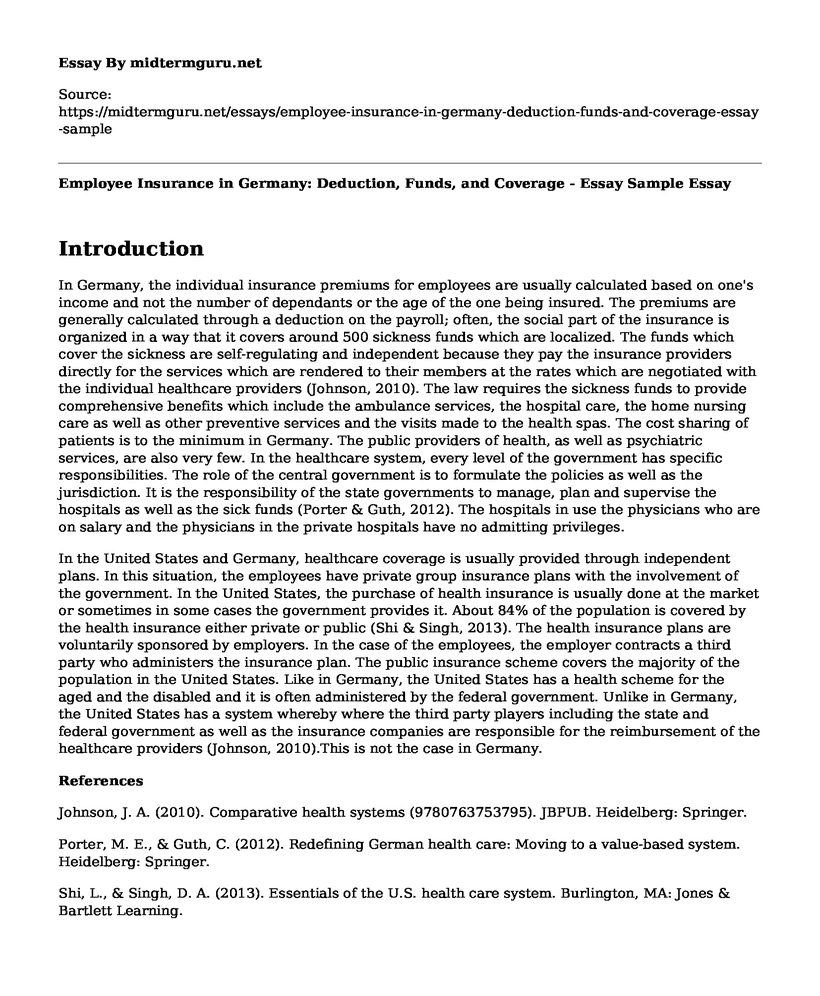Introduction
In Germany, the individual insurance premiums for employees are usually calculated based on one's income and not the number of dependants or the age of the one being insured. The premiums are generally calculated through a deduction on the payroll; often, the social part of the insurance is organized in a way that it covers around 500 sickness funds which are localized. The funds which cover the sickness are self-regulating and independent because they pay the insurance providers directly for the services which are rendered to their members at the rates which are negotiated with the individual healthcare providers (Johnson, 2010). The law requires the sickness funds to provide comprehensive benefits which include the ambulance services, the hospital care, the home nursing care as well as other preventive services and the visits made to the health spas. The cost sharing of patients is to the minimum in Germany. The public providers of health, as well as psychiatric services, are also very few. In the healthcare system, every level of the government has specific responsibilities. The role of the central government is to formulate the policies as well as the jurisdiction. It is the responsibility of the state governments to manage, plan and supervise the hospitals as well as the sick funds (Porter & Guth, 2012). The hospitals in use the physicians who are on salary and the physicians in the private hospitals have no admitting privileges.
In the United States and Germany, healthcare coverage is usually provided through independent plans. In this situation, the employees have private group insurance plans with the involvement of the government. In the United States, the purchase of health insurance is usually done at the market or sometimes in some cases the government provides it. About 84% of the population is covered by the health insurance either private or public (Shi & Singh, 2013). The health insurance plans are voluntarily sponsored by employers. In the case of the employees, the employer contracts a third party who administers the insurance plan. The public insurance scheme covers the majority of the population in the United States. Like in Germany, the United States has a health scheme for the aged and the disabled and it is often administered by the federal government. Unlike in Germany, the United States has a system whereby where the third party players including the state and federal government as well as the insurance companies are responsible for the reimbursement of the healthcare providers (Johnson, 2010).This is not the case in Germany.
References
Johnson, J. A. (2010). Comparative health systems (9780763753795). JBPUB. Heidelberg: Springer.
Porter, M. E., & Guth, C. (2012). Redefining German health care: Moving to a value-based system. Heidelberg: Springer.
Shi, L., & Singh, D. A. (2013). Essentials of the U.S. health care system. Burlington, MA: Jones & Bartlett Learning.
Cite this page
Employee Insurance in Germany: Deduction, Funds, and Coverage - Essay Sample. (2022, Dec 27). Retrieved from https://midtermguru.com/essays/employee-insurance-in-germany-deduction-funds-and-coverage-essay-sample
If you are the original author of this essay and no longer wish to have it published on the midtermguru.com website, please click below to request its removal:
- Informatics for Nursing and Health Care Professionals
- Project of Improving Nurses Practice Paper Example
- Essay Sample on Effects of Parenting on Health
- The Effects of Meditation on Sleep Disorders - Research Paper
- Paper Example on DNA Repair as a Critical Tumor Suppressor Function
- Paper Example on Professionalization of Social Care in Ireland
- Essay Sample on Pneumonia







